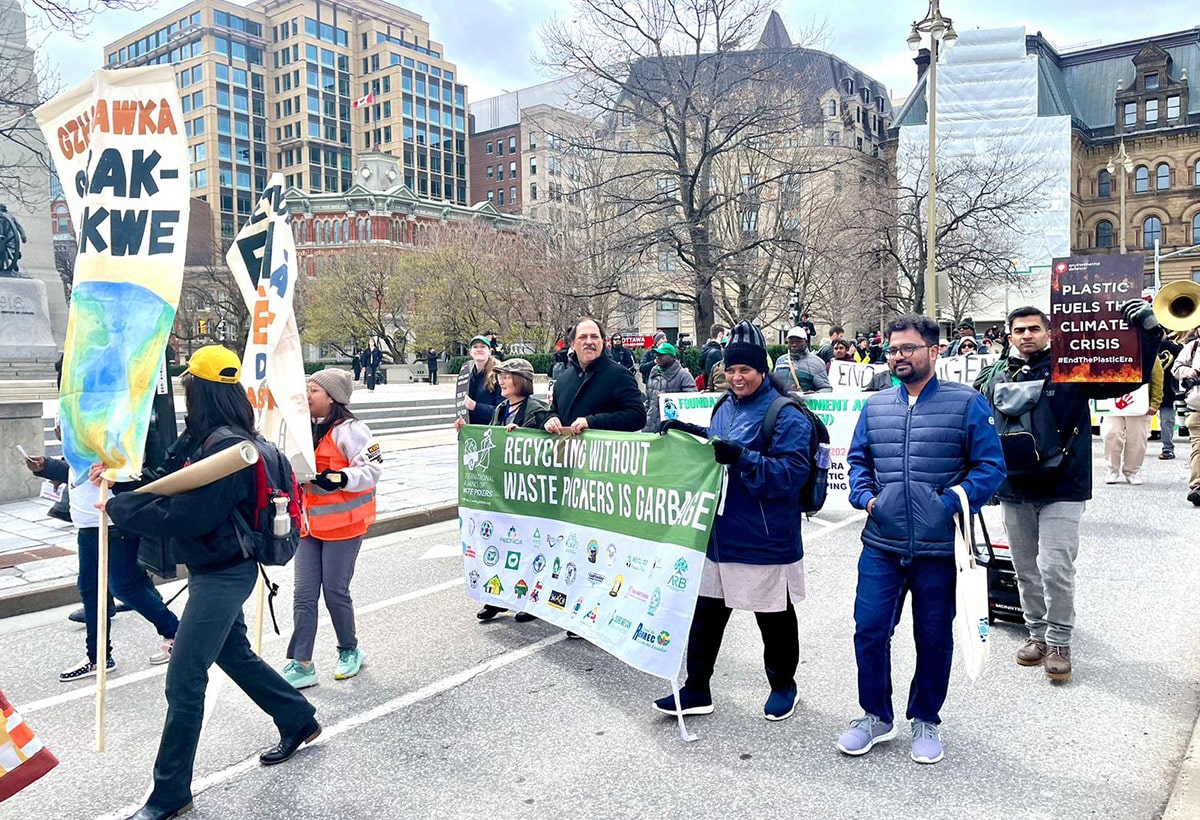Ottawa, Canada | Traditional, unceded territory of the Algonquin Anishinaabeg People — Today, hundreds of impacted community leaders and experts from around the world came together in the streets of Ottawa ahead of the fourth session of the Intergovernmental Negotiating Committee (INC-4) to advance a plastics treaty, marking a pivotal “make or break” moment for the Global Plastics Treaty.
Native and Indigenous leaders, frontline community groups, climate activists, youth leaders, healthcare professionals, waste-pickers, environmental advocates, scientists, and global allies from across civil society coming from all continents rallied together and marched from Parliament Hill to Shaw Center to deliver a unified message: The pollution from the entire plastic lifecycle threatens human life and our fundamental rights to health and the environment, including significant contributions to the climate crisis — especially for Black, Brown, Indigenous, frontline, and under-resourced communities, particularly in the Global South.
By marching together peacefully in the streets of Ottawa ahead of the negotiations, Break Free From Plastic movement members and allies want to remind negotiators of their obligations to protect human rights, human health, the environment, and the climate. The treaty negotiation process is meant to establish a legally binding instrument to rid the world of plastic pollution across the full life cycle, including a drastic reduction in the production of primary plastic polymers, and the mass mobilization in Ottawa is the people’s way of letting the negotiators know that we will not wait silently on the sidelines while petrochemical companies work together with the governments of fossil fuel-producing countries to trade away communities as “sacrifice zones” yet again.
The entire plastics life cycle comes at the expense of public health and human rights with plastic production playing a significant role in fueling the climate crisis. The mandate to negotiate the Treaty agreed on March 2022 during the the United Nations Environment Assembly (UNEA) was a groundbreaking achievement. Now is the time for governments to choose what sort of impact these negotiations will have on our shared future.
“We are here to demand that delegates negotiate a treaty that lives up to the promise of UNEA Resolution 5/14 — that means measures that address the full life cycle of plastics, beginning with production of plastics, which is the production of polymers. Delegates must act like our lives depend on it — because they do,” said Daniela Duran Gonzales, Senior Legal Campaigner with the Center for International Environmental Law. “Our climate goals, the protection of human health, the enjoyment of human rights, and the rights of future generations all rest on whether the future plastics treaty will control and reduce polymers to successfully end the plastic pollution crisis.”
Civil society groups have created a list of key demands for delegates at INC-4, focusing especially on a human rights-based approach for the negotiation of the plastics treaty, including centering the knowledge, voices, and experiences of people living on the frontlines of the crisis, Indigenous Peoples, workers, youth and other rights-holding constituencies.
These demands are designed to ensure that the treaty includes provisions to address the crisis across the entire life cycle of plastics, acknowledging that the life cycle begins with the extraction of raw materials and it covers the production of plastics, its feedstocks, and precursors. Support for non-toxic reuse systems are the primary solutions championed by civil society groups, including those living on the industry fenceline who suffer the worst impacts of the crisis, together with strong regulations on plastic waste trade to ensure an end to waste colonialism.
"Children and youth like me suffer the most from plastic pollution, and we are recognised as a vulnerable group,” said Aeshnina ‘Nina’ Azzahra, Founder of River Warrior Indonesia. “We all want our environment to be plastic-free, but please don't put your burden on the other side of the world—this is NOT fair. As adults who come to Ottawa to negotiate the plastic treaty, you must protect our rights to live in a healthy and safe environment."
###
Press Contacts:
- Brett Nadrich (U.S. & Canada): brett@breakfreefromplastic.org
- Cate Bonacini (Global): cbonacini@ciel.org
- Caro Gonzalez (Global): caro@breakfreefromplastic.org
Notes to the Editor:
Key demands from civil society groups for delegates at INC-4 are available here.
Additional quotes are available here.
Photos and videos of today’s march will be added here as they become available.
To tune in for live interpretations of the pre-march press conference and rally in English, French, and Spanish, please click here.
About Break Free From Plastic – #breakfreefromplastic is a global movement envisioning a future free from plastic pollution. Since its launch in 2016, more than 2,000 organizations and 11,000 individual supporters from across the world have joined the movement to demand massive reductions in single-use plastics and push for lasting solutions to the plastic pollution crisis. BFFP member organizations and individuals share the values of environmental protection and social justice and work together through a holistic approach to bring about systemic change. This means tackling plastic pollution across the whole plastics value chain—from extraction to disposal—focusing on prevention rather than cure and providing effective solutions. www.breakfreefromplastic.org




